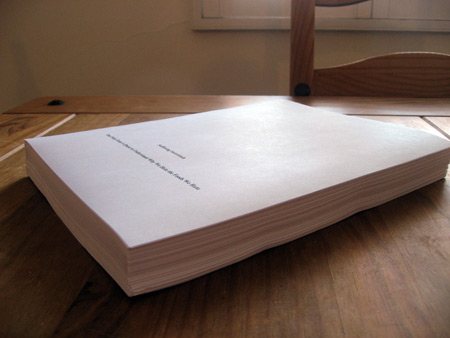
 |
 |
| Blurb Your Enthusiasm |
| December 7, 2011 |
 |
When you approach people for blurbs, you are, quite literally, asking for validation. Obviously, we all like to be validated, but having to ask for it so nakedly and then give a deadline by which that validation needs to be delivered feels embarrassing, needy, desperate, and presumptuous.
Blurbs are those 2-3 sentences printed on the back of a book that talk about how great the book is. As an editorial assistant for a fine art and photography press, I took blurbs very, very seriously. (Almost as seriously as I took catalog copy deadlines, which actually caused our managing editor to note with amusement, "Isn't she cute? She thinks deadlines actually MEAN something here!") At the time, we were bringing out one of our books -- Colefax & Fowler: The Best in English Interior Decoration -- in paperback and part of my job managing that process meant getting a cover blurb for it.
Somehow through phone calls and a little detective work -- this was over ten years ago, so all I had was Lycos -- I managed to track down the Prince of Chintz himself, Mario Buatta, and asked him if he would be willing to blurb the book. One of my proudest moments in publishing was when I pulled Buatta's one-line blurb from the fax and took it straight to my publisher, who I am certain had just given me the blurb task in order to give me something to do and was totally surprised by my results.
When I approached people as an editorial assistant, there was no ego involved, just the desire to deliver on a task. It was a challenge and I enjoyed that challenge. However, now that the time has come for me to approach friends and contacts to blurb the book I wrote, I'm squirming in my seat. See, when an editor asks for a list of potential blurbers, they're not after quotes from your mother or friends you've had since kindergarten. They're looking for, well, how should I put this? ...they're looking for famous people.
I'm not talking about famous people like how George Clooney is famous people (though how crazy would that be if George Clooney blurbed my book? "Everything I ever wanted to know about picky eating can be found in this book. -George Clooney, famous actor and handsome man"), I'm talking about famous people in the field of the book. You didn't know who Mario Buatta was, right? But people who bought Colefax and Fowler, or who at least know that Colefax and Fowler is a well-known decorating firm that dates back to the late 30s, know who Mario Buatta is.
Blurbs by famous people are there to say to the potential book buyer, "Hey, look at all these people you hopefully know and admire who like this book! That means you will, too!" Only people like Tina Fey, who is already known and admired, can get away with plastering her book with hilarious and fake blurbs.
So, who would be famous in my realm? Well, maybe an Alton Brown or an Anthony Bourdain. A Tom Colicchio or a Rachael Ray -- the heavy-hitting food names that everyone knows. (Seriously, though, it would be kind of hysterical to send Bourdain a book that's a sympathetic look at picky eaters.) But since the book is (hopefully) funny, I'd also be in the market for a Tina Fey or an Amy Pohler.
Slight problem: I don't actually know any of those people.
See, getting the book blurbed is way more personal than sending the book out for reviews. You're not asking people to remain impartial about the book, you're asking people to like the book and to write something down that documents how much like they it. Now, it's true that you're not asking people to like the book without reading it, because they do see some form of the finished manuscript in order to say something nice about it, but you are asking them in advance of seeing the book if they would be agreeable to receiving the book in order to say something nice about the book. Because of that, it's easier to approach people with whom you already have some sort of connection.
That sounds easy enough, except that with Facebook and Twitter, I find myself asking questions like, "Well, he follows me on Twitter, and we've @replied each other, but do I really know him well enough to ask for a blurb?" or "I mean, we're Facebook friends, but that doesn't mean she's going to want to read the book, right?"
Then comes the composing of these personal, "I'm asking for a very big favor" emails. Regardless of how well I know the recipient and no matter how breezy I try to sound in these emails, it still feels like I'm begging and pleading: "Hi, I know you're really busy but if you could read my book and maybe really like it and maybe write a few sentences saying how much you really like it, I'd really appreciate it, thanks."
So here I am, looking at a list of people I know/kind of know/don't know at all and deciding who I should ask for a blurb. As I look at each name, I have to decide: 1. how much weight their endorsement carries, which is gross, but is just how it is, since we're talking about marketing the book; 2. how well I know them, and vice versa; 3. if they like me enough to give favorable odds on them also liking the book.
How about you? Do you want to blurb my book?
| 


